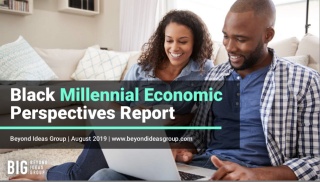Antonio White
Email: Antonio@beyondideasgroup.com
Phone: (216) 403-2896
57 percent of respondents indicated student loan debt was the most important economic issue for the upcoming 2020 election as economists hint at another recession that could hit minorities hardest.
(Black PR Wire) WASHINGTON, DC -- Healthcare, immigration, and the state of the economy dominate mainstream conversations on top voter issues in 2020, but new survey data suggests a majority of black millennial voters will choose candidates based on their student loan debt, criminal justice reform, and cybersecurity policy ideas. The survey, completed by Beyond Ideas Group, an integrated public affairs company founded by a former Obama White House and Treasury appointee, received over 400 responses. 94 percent of respondents indicated plans to vote in 2020. When asked about their most critical voting issues in 2020, 57 percent listed student loan debt as the most important economic issue, 36 percent noted criminal justice reform was the most urgent domestic issue, and 59 percent indicated cybersecurity was the most significant international issue.
“The data from this survey shows that much of the mainstream commentary around the economy or other policy issues hide the everyday realities and perspectives of many black millennials,” said Antonio White, founder and principal at Beyond Ideas Group. “It’s hard for many black millennials to prioritize fear of a possible recession when crippling student loan debt or family financial obligations loom above their heads. Every day might feel like a recession.”
The survey also asked respondents to describe their individual financial situations, including education, annual income, employment status, investments and assets, and overall debt. It also sought insight into generational wealth-building by gauging the degree to which black millennials would need to provide financial resources to aging or retiring parents. A majority of the respondents expected to provide some form of economic support to out-of-work family members in the future.
“These insights suggest black millennials are economically stretched thin and not very optimistic about their economic futures even despite some having significant levels of education,” said White. “If another recession comes, this group will be among the hardest hit.”
Economists back up these claims and predict another economic downtown could head the United States’ way. When the Great Recession ended in 2009, the median income for black households fell by 66 percent compared to just 16 percent for white families.
White expressed policy hopes for this survey, stating “with the threat of another recession, our goal is that this survey will prompt deeper conversation, more robust data, and, most importantly, policy change that protects our citizens and preserves the American Dream for all.”
The survey also posed questions on workforce diversity and inclusion experiences, but this data was not included in this report. For more information or to download the report, visit https://www.beyondideasgroup.com/millennials.

